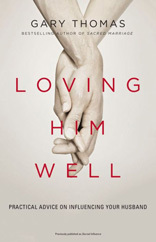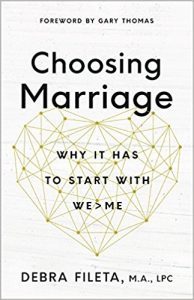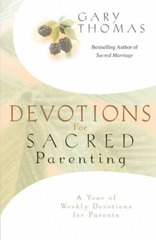Gary L. Thomas's Blog, page 54
February 5, 2018
Understanding the Mind of the Man You Married

Many marital problems arise not because of an issue between a specific couple— say, Jack and Jill or Larry and Sherry— but because of a breakdown in understanding between a male and a female. In the next three posts, I hope to offer wives some insight into the intricacies of the male mind so you’ll learn how to better communicate and live with your husband. But there will be plenty of helpful information for husbands to understand themselves, so men, please stick around!
The last several decades of neuroscience have demonstrated that well before a baby comes into this world, while it remains safely tucked inside the mother’s womb, the brain of a male baby gets bombarded with testosterone, while a female baby receives greater quantities of female hormones. Between the third and sixth month of that unborn baby’s life, hormones begin to shape the tiny brain, influencing how that individual will interact with the world. Yes, males receive some female hormones, and females receive some testosterone, but the quantities of these hormones (males have up to twenty times more testosterone than females; females tend to have much more oxytocin than males) will stamp that child’s brain by the sixth month of pregnancy—three months before any mother or father has a chance to “socialize” it.
Admittedly, there exist what neuroscientists call “bridge brain” males and “bridge brain” females. Our tendency toward masculine or feminine brains occurs on a continuum, resulting in various degrees of stamping. But even here, a “bridge brain” male will have more testosterone than a “bridge brain” female.
The male brain therefore functions much differently than the female brain. Dr. Louann Brizendine, who studied at Yale and Harvard and is now on the faculty of UCSF Medical Center, states, “The vast new body of brain science together with the work I’ve done with my male patients has convinced me that through every phase of life, the unique brain structures and hormones of boys and men create a male reality that is fundamentally different from the female one and all too frequently oversimplified and misunderstood.”
While our brains are more “plastic” (that is, moldable) than we used to think and therefore susceptible to socialization, according to Dr. Brizendine, “male and female brains are different from the moment of conception.” Since brains develop by degrees, stereotyping can lead us astray, but certain things tend to be true. For example, male brains usually have less serotonin than female brains. Since serotonin calms people down, men are more likely to act explosively and compulsively. Surprised? Probably not.
Here’s another example. Men also have less oxytocin in their brains. Oxytocin has been called the “cuddle chemical” as well as the primary generator of the “tend- and- befriend” instinct. In general, the more oxytocin someone has, the less aggressive he or she is likely to be. On the positive side, more oxytocin usually means more empathy, making the person more likely to notice how you’re feeling and more likely to inquire about it.
Why is your husband less likely to tune in to your emotional pain and verbalize his concern than, say, your sister or your best friend? His brain doesn’t work the same way a female brain does; it just doesn’t occur to him to connect his affection with verbal inquiry. The “mirror- neuron system” of your husband’s brain, which Dr. Brizendine calls the “ ‘I feel what you feel’ emotional empathy system”— the system that helps a person get “in sync with others’ emotions by reading facial expressions and interpreting tone of voice and other emotional cues”— “is larger and more active in the female brain.”
Remember, this is true not only of your husband in particular; it’s true of men in general. Be careful that you don’t fault or resent your husband for being a man!
If you want to motivate your husband and communicate with him, as well as enjoy a fulfilling marriage with him and raise healthy kids with him, stop expecting him to act or think like a woman. He can’t do that. Nor should he.
Rid yourself of every tactic and skill you use in talking to your sisters, best friends, and mother, and realize that a man’s mind functions very differently. Some similarities exist, of course, so a few things will interrelate. But if you expect him to talk to you like your lifelong best friend does or your sister does or your mother does, and evaluate him on that basis, you’re being unfair. And you’re going to be disappointed.
This post is all about understanding that your husband is biologically wired to relate to you differently than you relate to him or your female friends. Influence begins with understanding, and in the next two posts, we’ll seek to delve into how you can make this work in your marriage’s favor.
If you want that information sooner, this post is adapted from my most recent book Loving Him Well: Practical Advice on Influencing Your Husband. Loving Him Well is a substantial rewrite of Sacred Influence, with about fifty percent of it being completely new. I’ve worked with many more couples over the last decade-plus that Sacred Influence has been out. For instance, there’s an entire chapter helping the church deal more appropriately with abusive marriages (though the book isn’t written for women in abusive marriages). Due to my own ignorance and lack of experience, I wasn’t sensitive enough to that issue when Sacred Influence first came out. And whereas Sacred Influence had a few paragraphs about wives dealing with porn-watching husbands, there’s now an entire chapter (in fact, now the longest chapter in the book) devoted to that subject. High speed Internet access has changed everything in this regard over the past decade and a couple paragraphs will no longer suffice.
I didn’t recommend any one buy revised editions of Sacred Marriage, Sacred Parenting or Sacred Pathways if they already had the originals, as these were rather light glosses, mostly tightening things up, clarifying a bit, and updating cultural references. But Loving Him Well is more than a rewrite—it’s a substantially different book (with about half the content being the same as its predecessor, however).
You can check it out here:
http://www.garythomas.com/books/lovin...
The post Understanding the Mind of the Man You Married appeared first on Gary Thomas.
January 31, 2018
The Bubble Busting Spouse

Robert has an admittedly sordid history with pornography. He has been in recovery for years, has set up appropriate accountability and has gone out of his way to rebuild his marriage.
He has (in his words) “devoured” my book Cherish and has sought to apply every principle in every chapter. He knows he can never remove the hurt he has caused his wife in the past. He knows she will always feel a sense of betrayal, but he is working diligently to cherish her in the present in order to give her hope for the future. He has kept a “cherishing journal.” He makes the bed every day, praying that God would bring joy back into their intimacy. He keeps fresh flowers in the bedroom. And he has learned to make sex all about his wife’s pleasure. She is discovering, to her great delight, that it’s possible for a thoughtful middle-aged husband to help his wife experience two or more “standing ovations” during a single performance.
His efforts outside the bedroom are just as intense. On vacation, he plans for her enjoyment and fun. He tries to make the most of every birthday and anniversary (as well as Valentine’s Day).
On a recent birthday, he researched and purchased the perfect birthday present for her and couldn’t wait to give it to her (though he waited to let her sleep in). She was delighted when she opened it. He then had two options for breakfast—her favorite restaurant or her favorite meal at home. She opted for the restaurant.
Robert took great pains to get ready. His wife had scolded him for always wearing a “Jerry Seinfeld” outfit of jeans and running shoes, so he picked out an outfit that he thought would perhaps even impress her.
“Gary,” he told me, “I came out of the bedroom all dressed up, feeling like a boy who is looking at his mom before he goes to school, hoping she’d be impressed that I have listened and changed, and the only thing she said was, ‘Your shirt is wrinkled.’”
Robert didn’t respond the way he wishes he would have or should have. But this was not the first such “bubble busting” occurrence. He knows he has messed up. But he also knows he has changed and that there has been great improvement in virtually every aspect of their marriage. He doesn’t want his wife to pretend the past never happened, but he does want her to acknowledge that the present is very different.
“Our family knows her as a ‘bubble buster,’” Robert explained. “The family joke is that when one of her grandchildren is old enough to draw her a picture, she’s likely to say, ‘The leaves are the wrong color.’”
Forgiveness is difficult. It takes time to fight past resentment and contempt for a spouse’s past failings. But if you have decided to work through whatever the issue was, then part of working through it is learning to “reboot” your brain and acknowledge the progress your spouse has made. Sometimes, we fear that acknowledging a new present might diminish the hurtful past. That’s not true. That’s a lie. But you punish yourself and your spouse if you keep acting like nothing has changed.
Robert remains committed to cherishing his spouse. I admitted to him that one of the potential weaknesses of Cherish is that marriage is much sweeter when both spouses embrace the message. Lisa and I are in the midst of our best marital years by far because we are both committed to the idea and practice of cherishing each other. Doing so makes marriage very sweet, indeed.
“Unilateral” cherishing still makes marriage better, but it’s not the same and it won’t produce the same results. It can help, but the marriage will still have its weaknesses.
If your spouse is trying to grow, don’t hold her or him back by nailing them to the past. Acknowledge the growth. Don’t compare them to where you wish they would be, especially if your wish is a perfect spouse. Compare them to what they were, be thankful for the growth and encourage them.
My fear is that Robert may be tempted to give up. He has had many doors slammed in his face. My prayer for him and my counsel for him is to persevere, and to find creative ways to share with his spouse how this “bubble busting” is holding both of them back.
I wish his spouse would read Cherish. She’s of the mindset, however, that because Robert is the one who “messed up,” he’s the one who needs to experience all of the “fixing.” She’s missing out on some sweeter seasons of marriage, perhaps not realizing how far a husband will go to preserve a cherishing marriage once he tastes it.
Let’s pause for a moment and ask ourselves, do we acknowledge our spouse’s growth? Are we comparing them with how much better they are now than they used to be, or are we downgrading them because they’re still not where we think they should be? Do we think discouragement fosters more change than encouragement? Wouldn’t you rather go out on a date with an enthusiastic and earnest husband who has a wrinkled shirt than blow up a date by essentially saying, “I know you tried really hard, but you still don’t quite measure up?”
Let’s not be bubble busters. Let’s learn to cherish each other as we are and as we grow into the people we yet want to be. After all, doing so is ultimately for our own good.
[As always with posts of this kind, I want to emphasize that I am not calling wives in abusive and violent marriages “bubble busters.” There are some marriages from which women need to be saved, and cherishing isn’t an appropriate strategy to confront violence.]
If you’re a wife reading this who recognizes a little bit of herself in Robert’s wife, I urge you to consider getting a copy of my newest book Loving Him Well: Practical Advice for Wives to Influence Their Husbands. It’s a substantial re-write of Sacred Influence. You can read more about it here: http://www.garythomas.com/books/loving-him-well/
The post The Bubble Busting Spouse appeared first on Gary Thomas.
January 26, 2018
Where is Gary Speaking this Spring?

Come join us for one of Gary’s events near you this spring!
FEBRUARY
February 2-4 -Lifelong Love at First Bible Church in Decatur, AL. For more information, click here.
February 8 – Sacred Search at Bellevue Baptist Church in Memphis, TN. For more information, click here.
February 9 – Cherish Event at Bellevue Baptist Church in Memphis, TN. For more information, click here.
February 10 – Cherish Event at Grace Marriage Ministry Conference in Owensboro, KY. For more information, click here.
February 11 – Sunday Services at Pleasant Valley Community in Owensboro, KY. For more information, click here.
February 15 – At Stake Ministries in Brookville, KS. For more information, click here.
February 16 – Cherish Event at First Covenant Church in Salina, KS. For more information, click here.
February 22 – Cherish Event at St. Catherine of Sienna Catholic Church in Orange Park, FL. For more information, click here.
February 24 – Cherish Event at North Jacksonville Baptist Church in Jacksonville, FL. For more information, click here.
MARCH
March 10-17 – Winshape Marriage Cruising Adventure. For more information, click here.
March 20 – Hopeline Pregnancy Resource Center Fundraising Dinner in Stamford, CT. For more information, click here.
March 21 – Hopeline Pregnanacy Resource Center Fundraising Dinner in Danbury, CT. For more information, click here.
March 22 – Hopeline Pregnancy Resource Center Fundraising Dinner in Trumbull, CT. For more information, click here.
APRIL
April 12 – Life Forward Pregnancy Care of Cincinnati in Cincinnati, OH. For more information, click here.
April 19 – Sacred Search Event at Northpointe Community Church in Fresno, CA. For more information, click here.
April 20-21 – Sacred Marriage Event at Northpointe Community Church in Fresno, CA. For more information, click here.
MAY
May 11-12 – Cherish Event at Second Baptist Church, South Campus in Houston, TX.
The post Where is Gary Speaking this Spring? appeared first on Gary Thomas.
January 25, 2018
12 Signs Your Marriage Needs Attention

Due to a degenerative eye disease, I live with basically one eye. You wouldn’t know it looking at me, but an ophthalmologist explained to me that my left eye has reached the point where my brain doesn’t rely on it any more. What I see basically comes through my right eye.
I write with “one eye” too. I’m a “spiritual” writer, steeped in the Christian classics, theology, and decades of studying Scripture. When I address marriage, it’s automatic for me to view it through that one lens.
Debra Fileta writes with two eyes. She has an uncanny “spiritual” awareness. By that I mean she understands not just biblical truth, but also biblical sense. Added to that, however, her other “eye” is the eye of a trained marriage therapist. She has worked successfully with numerous couples, and can see patterns that “thinkers” who often write in book-paneled rooms might miss.
Her newest (upcoming book available for pre-order) “Choosing Marriage” is a marvelous way to describe, in just two words, the spirituality of marital commitment. The phrase itself is loaded with profound theological meaning and provides a helpful metaphor. But Debra doesn’t stop there. She offers numerous tools to make choosing marriage seem possible and practical. In other words, Debra doesn’t just inspire us—plenty of “spiritual” writers do that; she also equips us. Rare is the writer who lives in both worlds so effectively.
Here’s a taste of what you can expect when Choosing Marriage comes out in May:
***********************************************************************************************
The dangerous rift between two people in a marriage doesn’t happen overnight. Just like anything significant, marriage takes time to build – and it also takes time to tear down.
But sometimes, we begin to slide away from one another without our realizing that the rift is happening. Like the slow dripping of a leaky faucet, we get so accustomed to the pattern of the noise that we don’t even realize that something is broken. Something is in need of attention.
But step by step, day by day, year by year…we disconnect.
Maybe it’s that we’re not taught how to fight against the drift. Or maybe we’re just not in tune to the drifting when it happens. But either way, if we’re not careful, we can find our marriages in a place we never intended for them to be.
If you find yourself dealing with one or more of the following issues in your marriage, it’s time to take seriously the suggestion that your marriage needs attention.
12. If you find that you’re filled with more bitterness toward your spouse than affection – your marriage needs attention.
11. If you find yourself arguing with one another more than connecting with one another – your marriage needs attention.
10. If your disagreements constantly escalate, and end in more conflict rather than a resolution – your marriage needs attention.
9. If you find yourselves passing each other like “strangers” rather than interacting as friends – your marriage needs attention.
8. If you commonly go through your day without touching or connecting physically – your marriage needs attention.
7. If, more often than not, you feel more emotionally drained after being together rather than emotionally filled – your marriage needs attention.
6. If you never have disagreements. Ever. Ever. Ever. – your marriage needs attention. (This tells me that real needs and desires aren’t being expressed on a regular basis and that passivity or safety need to be explored).
5. If you’re so busy or distracted that you have less than 30 minutes of quality conversation in your week – your marriage needs attention.
4. If you feel disconnected and not “in tune” with one another spiritually and emotionally – your marriage needs attention.
3. If you have unresolved issues from the past that keep coming up to haunt your relationship in the present – your marriage needs attention.
2. If you are clueless about your spouse’s activities, interactions, and behaviors when you’re not around – your marriage needs attention.
1. If you would rather spend your free time with people other than your spouse – your marriage needs attention.
It’s time to get serious about getting your marriage to a better place. It’s time to be deliberate about giving your marriage the attention it deserves. Because attention breathes life into a marriage.
If you want practical steps, detailed advice, and a candid look into what it means to invest in your marriage and take it to a better place, check out my new book, Choosing Marriage. It’s filled with astonishing survey results from over 1,000 married people. I poured my heart and soul into it, and I believe it’s going to change marriages and relationships across the globe…one choice at a time.

Comment below: What are some ways you give “attention” to your marriage?
Debra Fileta is a Professional Counselor, national speaker, relationship expert, and author of True Love Dates: Your Indispensable Guide to Finding the Love of Your Life, where she writes candidly about dating, relationships, and how to find true love. Her newest book, Choosing Marriage, is set to be released in the Summer of 2018! You may also recognize her voice from her 200+ articles at Relevant Magazine, Crosswalk.com, and all over the web! She’s the creator of this True Love Dates Blog, reaching millions of people with the message that healthy people make healthy relationships! Connect with her on Facebook or Twitter or book a session with her today!
The post 12 Signs Your Marriage Needs Attention appeared first on Gary Thomas.
January 19, 2018
They Just Don’t Understand

Blessed are you when people insult you, persecute you and falsely say all kinds of evil against you because of me.
Matthew 5:11
Melissa has to leave her home every Tuesday and Friday at 3:00 p.m. to take Christy to a physical therapy session on the other side of Chicago. Because she wants to leave Christy in school for as long as possible, the late-afternoon trips put them in the thick of commuter traffic, and they don’t return home until 7:00 p.m.
Christy hates these therapy sessions, but they’re doing wonders for her ability to walk with a normal gait. As Melissa welcomed Christy into the car one Tuesday afternoon, Christy hissed at her: “I’ll never forgive you for doing this to me.”
Melissa wanted to ask Christy what she wouldn’t forgive: the four-hour trips twice a week through heavy traffic, all to help Christy walk better? The vacations she and her husband, Greg, had given up so they could have the roughly $1,200 a month to spend on special services, education, and therapies to help Christy learn how to cope? The many nights Melissa spent on the Internet, trying to find the best services and support materials to help Christy overcome her challenges? Melissa has given just about every ounce of strength she has to help Christy deal with her disabilities—and for that, Christy will never forgive her?
It’s one thing to sacrifice for your child; it’s another thing to have that child look at your sacrifice and act as though it were child abuse—but Melissa already felt tired. The other kids didn’t feel well that day, so she had done some of their chores. She was afraid to speak a word, because she knew that once she started, she might never be able to stop. And who knows what she would say if her mouth ran on?
To be a parent is to be misunderstood. To be a mom or dad is to have your kids, extended family members, friends, and even strangers second-guess you, question your motives, and pass judgment on your decisions. And to have our good motives questioned is certainly one of the most frustrating human experiences we face.
But would you like to know the secret blessing behind this pain? Every effective Christian worker will eventually be misunderstood, at least on occasion. When God allows us to confront this process as parents, he is preparing us to handle a fact of life with regard to working on behalf of his kingdom: To minister is to be attacked, questioned, and maligned.
In fact, during the time Jesus walked this earth, he was almost universally misunderstood. At times, even Jesus’ own family considered him crazy (Mark 3:20–21). The religious leaders misunderstood Jesus’ ministry, accusing him of being in league with the devil (Mark 3:22). Civic authorities thought Jesus’ actions made absolutely no sense (Matthew 27:14). Even Jesus’ own disciples had trouble understanding him (Mark 8:31–33).
Jesus came to us as God and was accused of being the Devil. He spoke the truth and yet was called a liar. He willingly went to the cross out of obedience to his Father and yet was labeled a blasphemer. He embodied our only hope, yet died as a criminal. If anybody was continually misunderstood, it was Jesus. No one’s intentions, abilities, and motives got distorted and challenged more often than Jesus’.
When God allows others to think less of you, to judge you, to challenge you, to malign you, he is bringing you into rare but intimate country—the sufferings of Christ. This is where the valley of misunderstanding stretches far and wide and where seemingly few places of rest exist. Though you’ve no doubt wanted to leave this valley many times, God’s severe mercy keeps you there. You get to experience a side of him that others will never know. And God may be preparing you for a ministry somewhere down the road that will bring additional misunderstandings.
I want Christ’s power. I want Christ’s love. I want Christ’s wisdom. Who doesn’t? But Paul invites us to an even more intimate relationship—Christ’s sufferings: “I want to know Christ and the power of his resurrection and the fellowship of sharing in his sufferings” (Philippians 3:10, emphasis added). A child who brings multiple misunderstandings may be your surest passport to that holy place.
This week, reflect on how difficult it is to do what you know must be done with your children, even though others (including your children) question your motives. Ask God to strengthen you to live in accordance with his will, not for the world’s pleasure or applause. Seek to become a spiritually stronger parent who, when freed from the need to be understood, appreciated, or affirmed, can join Jesus Christ in preaching a message the world has never thought made much sense.
Lord Jesus, how it must have grieved your soul to act solely out of love and to be accused of hate. Draw us close to you and give us your strength when we seek to do what is best for our children yet are questioned, maligned and resented. Help us always to act with pure motives. In Your Name we pray, Amen.
This week’s blog post is an excerpt from my book Devotions for Sacred Parenting. If you need a short pick-me-up every now and then to remind yourself about the sacred side of parenting, you might enjoy this collection of 52 devotions.
The post They Just Don’t Understand appeared first on Gary Thomas.
January 11, 2018
Vending Machine Prayers

In his book, My Name Is Hope, John Mark Comer contrasts “vending machine prayers” with “prayers in Jesus’ name.” When applied to marriage, the analogy is quite illuminating.
John Mark writes, “Vending machine prayers sound like, ‘God, my marriage is a wreck. Fix my marriage. Make me happy with my spouse.
“Prayers in Jesus’ name sound like, ‘God my marriage needs your healing Spirit. Please transform me from the inside out and help me to love my wife.”
Which prayer sounds most mature to you? Which prayer is most likely to lead to spiritual enlightenment? Which prayer is most likely to lead to a marriage that honors God and is ultimately more satisfying?
Pray that prayer.
Another vending machine prayer would be, “God I’m so frustrated about the lack of meaningful sex in my marriage. Would you please fix my wife/husband and make her/him care?”
A prayer in Jesus’ name might be, “Lord, help me to become the kind of loving spouse my husband/wife desires to be intimate with. Show me any hurts or actions that might be hindering our intimacy, and lead us toward a place of generosity and service in this area.”
The right kind of prayer can be so effective, but some “prayer” really isn’t prayer. It’s complaining. It will never change you or your marriage. When a couple comes to me for an hour of “pastoral counseling” and spend the first 50 minutes talking, they don’t leave with much, frankly. Prayer can be just like that. God doesn’t need our “information.” What he needs are humble hearts willing to listen and to be transformed.
We have a lot of readers on this blog so I want to ask your assistance to “finish” this blog post. Just as John Mark gave an example of a common vending machine prayer, and then offered the alternative “prayer in Jesus’ name,” will you take the time to do the same in the comments section? Write out a typical “vending machine prayer” as it relates to marriage and family, and then write out the better “prayer in Jesus’ name.”
I’ve never tried this before—asking readers to write the blogpost. But I know from past comments we have many godly, wise, and gifted readers. So this could be fun…
The post Vending Machine Prayers appeared first on Gary Thomas.
January 2, 2018
Dating

Should singles date someone only if they think they would like to marry them?
One of the more common comments I get after a seminar, or after someone has read The Sacred Search, is this: “Should dating be reserved only for someone you think you want to marry?”
The following email excerpt is typical:
“My parents did not allow us to have boyfriends growing up unless we were sure we wanted to marry them. So I grew up with the mindset of viewing guys through the lens of marriage material. When you’re in your early 20s and men are all over the place, it was easier than it is now, being 28 years old, single, a professional, not very experienced and facing family and community pressure on not being married… I had started to lose hope that following Christian values was not working…”
I so wince at that leap in logic: “I had started to lose hope that following Christian values was not working…”
An entire generation of Christians has grown up with the thought that dating is dangerous at best, and many are now in their thirties re-thinking that strategy, fighting not to become bitter and even questioning their faith. Let’s not assume, however, that what they were taught necessarily constitutes “Christian values.”
Joshua Harris has made headlines admitting that he might be in the process of re-thinking his message from his popular 1997 book, I Kissed Dating Goodbye. I actually quote from Joshua’s book in The Sacred Search and while I’m pleased he’s re-thinking certain aspects of it, I have to confess that my dating lifestyle was not healthy, and I can imagine I could have benefitted from drifting more toward Josh’s teaching. Yet many are now telling me that their “non-dating” lifestyle wasn’t healthy, either. I believe Josh tried to thoughtfully counter many abuses in his (and my) day, and I’m grateful for his heart and courage (both then and now). Attacks on books usually take a few provocative statements out of context, make leaps in logic the author never intended, and often try to extend the logic to points that are absurd, and I have no interest in doing that to Josh.
But it’s fair to raise the question: what’s “responsible dating?” How serious do you have to be about each other before you become “exclusive?”
I talk with an increasing number of singles who were so fearful of making a mistake in dating that they never really did, and now feel like they have fewer choices than ever. Beliefs have consequences. If you fear dating, you may be closing the door on a primary avenue of finding someone to marry.
I’d like to throw out a few observations, and let you all react as you think it’s appropriate. This blog is more about opening up a conversation than it is about providing answers. I’ve said much of what I thought in The Sacred Search: What If It’s Not About Who You Marry, but Why?
The cultural reality of the Old and New Testaments were so radically different than today’s environment of choosing whom to marry that trying to find an authoritative “biblical pattern of dating” is a fool’s errand. We can (and should) apply biblical principles about how to treat each other, but there is not a true biblical method to follow, and talking as if there is one is hubris.
The frequent, very emotionally-involved dating cycle with many women that I grew up with was unhealthy and not conducive to finding a mate. We became exclusive as soon as we had feelings for each other, and when the feelings faded, we broke up. This created much hurt and wasted much time. Removing dating from any thought of potential marriage took me away from a more productive use of those years. Joshua might have over-done it when writing about courtship; I certainly over-did it when, in practice, I dated exclusively as soon as I felt like it.
One of the limitations of “courtship” is that you get locked into a relationship and are determined to try to make it work (since it does seem more serious than dating) when it may not be a wise match. A pseudo-engagement may receive more effort than it deserves or more commitment than the relationship can support. I implore singles to be very cautious about the first use of those two famous words “love” and “marriage.” You can’t take those words back, and I’ve seen a premature expression of them sap the joy out of a couple getting to know each other.
It’s healthy for young people to spend time with the opposite sex; it can also be helpful for young people to spend time with the opposite sex in a one-on-one setting. But how can we do this in a way that protects our emotions and doesn’t lead to a series of sexual relationships?
A godly person will not be quick to declare their emotions when they know infatuation is intense and fleeting. They will want to protect their heart and the heart of the person they’re interested in, more than they’ll want the immediate satisfaction of having an infatuation returned.
The “process” of dating does matter, as it turns you into a certain kind of person—one who takes selfish advantage of others or one who learns to serve and protect others. My unhealthy attitudes toward dating carried on into my marriage and nearly destroyed it in the early years. I hadn’t exposed the lies and selfishness behind dating and wasn’t emotionally or spiritually prepared for marriage. Thank God for his grace and Lisa for her perseverance.
A lot of singles come to this blog when we raise topics like this, so if you’d like to add some of your reflections in the comments, feel free. And singles, please let us know what it’s like out there!
The post Dating appeared first on Gary Thomas.
December 27, 2017
Take Your Marriage to the Third Love in 2018

In his book The Four Loves, C.S. Lewis shows how wide-ranging the word “love” is. It is used to define many different notions and mind-sets.
What if you can take your marriage up a level this year?
The first form of love (according to Lewis) is Need-Love, which is today what we call infatuation. “I need you, therefore I love you. I want you to meet my needs. I crave you. I can’t make it without you.” It looks so romantic in the movies, but when you look at the base psychology behind it, it’s actually a bit unnerving. Need-Love creates a high level of desperation and resentment. You can’t build a marriage on it.
The second form of love could be called “Sacred Marriage” love; Lewis uses the phrase “Gift-Love,” but it basically means wanting to serve, even to the point of suffering or sacrifice. It’s a noble love, always putting the other’s  best (as God defines “best”) first. It remains, I believe, the foundation of a God-honoring marriage.
best (as God defines “best”) first. It remains, I believe, the foundation of a God-honoring marriage.
The third love, “Appreciative-Love,” is the same concept I write about in Cherish. It’s about celebrating, appreciating, and adoring.
Here’s how Lewis ties all of them together: “Need-Love says of a woman, ‘I cannot live without her’; Gift-Love longs to give her happiness, comfort, protection—if possible, wealth; Appreciative Love gazes and holds its breath and is silent, rejoices that such a wonder should exist…”
We can’t choose “Need-Love”—and looking at what it actually is, who would want to? Infatuation just seems to happen. It’s something we should probably want to get out of sooner rather than later so that we can move on to choose Gift-Love. Gift-Love is easier to attain than cherishing love in that it’s all based on actions. We can choose to serve. We can choose to sacrifice. We can choose to put someone else’s welfare above our own. We just have to act.
The third kind of love, what Lewis calls “Appreciative Love” and what we will call “cherishing love” isn’t as easy to apply as Gift-Love because rejoicing and adoring isn’t solely an act of the will. You have to develop a heart and mind that fosters it, which then gives birth to it. It goes beyond action to the heart.
What I discovered in Cherish is that such a love is attainable, if you’re willing to adopt a long-term program. It begins with following through on a commitment (made in my marriage vows to love and to cherish until death do us part, covered  in chapter 1), adopting a cherishing mindset (the “only man or woman in the world” analogy, chapter 2), and then learning to showcase my spouse (chapters 3-4), changing the way I speak to and about her (chapter 8), reveling in her uniqueness (chapter 9), fighting off contempt (chapter 5) and applying grace to go the distance (chapter 10), applying some tried and true practices (chapter 11), and then going back to the truth of the Gospel so that I could keep doing all the above (chapter 13). The entire program can eventually create that once illusive but oh so rewarding “third love.”
in chapter 1), adopting a cherishing mindset (the “only man or woman in the world” analogy, chapter 2), and then learning to showcase my spouse (chapters 3-4), changing the way I speak to and about her (chapter 8), reveling in her uniqueness (chapter 9), fighting off contempt (chapter 5) and applying grace to go the distance (chapter 10), applying some tried and true practices (chapter 11), and then going back to the truth of the Gospel so that I could keep doing all the above (chapter 13). The entire program can eventually create that once illusive but oh so rewarding “third love.”
If you feel your marriage is mired in a stand-still, where selfishness reigns and you don’t even know if you want to go on, you need to lay the foundation for your marriage with the message of Sacred Marriage. If you feel committed to the marriage but it’s a struggle to stay connected, then you’re looking at the area covered in A Lifelong Love. But if you’re eager to experience marriage at its best, to taste a Song of Songs kind of relationship to reach that “third love” stage, Cherish is the book for you.
 Lisa gave me a tremendous gift this past year. She made artwork out of one of the main Bible verses behind Cherish: “My dove, my perfect one, is the only one” (Song of Songs 6:9). But I asked her to make it smaller, and to put it beside or above one of my favorite photos of her. I can already tell that it will become one of my most prized possessions because it celebrates “my only one.” Under my fascination with God, nothing quite moves my heart like thinking about Lisa.
Lisa gave me a tremendous gift this past year. She made artwork out of one of the main Bible verses behind Cherish: “My dove, my perfect one, is the only one” (Song of Songs 6:9). But I asked her to make it smaller, and to put it beside or above one of my favorite photos of her. I can already tell that it will become one of my most prized possessions because it celebrates “my only one.” Under my fascination with God, nothing quite moves my heart like thinking about Lisa.
Here’s another secret I’m learning: cherishing grows. When you enter it, you eventually discover it’s not a park, it’s a large country with many meadows and streams and forests and caves and rivers to explore. Infatuation collapses in on itself; cherishing expands. There is more to explore in cherishing love, in fact, than this life gives us opportunity to, which has led me to believe that cherishing love provides us with one of the earliest glimpses of heaven we can ever experience this side of eternity.
Note: Focus on the Family is re-airing my two-day interview on Cherish Thursday and Friday, December 28-29, as part of their “Best of 2017 re-broadcasts.”
On December 28 and 29 you can listen to the interviews here:
www.focusonthefamily.com/radio
After the airdate, you can listen to them here:
http://www.focusonthefamily.com/media/daily-broadcast/cherish-your-spouse-change-your-marriage-pt1
http://www.focusonthefamily.com/media/daily-broadcast/cherish-your-spouse-change-your-marriage-pt2
The post Take Your Marriage to the Third Love in 2018 appeared first on Gary Thomas.
December 20, 2017
4 Ways I’m Working to Better Cherish My Wife

It’s hard to believe, but we’re near the end of 2017. It’s been a good year.
2016, on the other hand, was not my favorite. I put on a lot of weight, didn’t watch what I ate, and didn’t exercise on a consistent basis. I swept some unresolved conflict with my boss under the rug and pretended it didn’t exist. For the first time in years, I panicked when I taught or made announcements at church. And, after a role change on our staff, I struggled with my value, worth, and identity.
At the end of the year, I knew I needed to make some changes in my life. As I addressed my health issues, unresolved conflict, speaking anxiety, and identity in Christ, I also knew it was time to work on my marriage.
As a marriage pastor in the church, I had a good marriage. Kristen and I got along well, pursued Christ together, and led our family as a united couple. But, I knew I could improve my marriage, specifically in the ways I served my wife and our family. Too often, I couldn’t say, “Follow me as I follow Christ” (1 Corinthians 11:1).
In 2017, I wanted to grow our marriage from good to great. There are many areas we were doing well, but we know we could always improve.
In January, I read Gary’s book, Cherish: The One Word That Changes Everything For Your Marriage. This was the right book, at the right time, for me and for my marriage. I knew I could do a better job of cherishing Kristen in the small ways by paying more attention to her, giving her hugs, encouraging her as a mom, and by being more patient with her in the areas where she could grow.
But, I also took note of the ways I could cherish her in big ways. In particular, I landed on four ways I could do a better job of cherishing my wife in 2017.
1) I’m dealing with my selfishness.
I’m the most selfish person I know, and selfishness has no place in a Christian marriage. James 4:1 says, “What causes quarrels and what causes fights among you? Is it not this, that your passions are at war within you?”
If you’ve been married for more than one minute, you know selfishness is a problem in marriage. It’s easy to spot in our spouse, but much harder to see in our own life. Here are a few ways selfishness might play out in your marriage.
You struggle with food and overeating or alcohol and drinking too much. The selfish spouse makes the decision to satisfy their fleshly desires instead of honoring God and their spouse.
You hear your baby crying, but you act like you’re asleep. Don’t Do It.
Maybe you shop and spend too much money on clothes when you know finances are tight.
You choose to satisfy your desires with porn instead of by pursuing your spouse.
The Solution: Act like Christ. Read Philippians 2:5-11 and take note of the ways Christ selflessly served us. Read James 4:8 and draw near to God. The closer we draw to God, the more we can deal with our selfishness.
2) I’m living with my wife in an understanding way.
I love my wife, but we are definitely two VERY different creatures. She likes to save things, I like to throw it all away. Her inbox holds thousands of emails, while mine is in the single digits. She likes things clean, while I like them neat. Sometimes those differences can be a source of attraction, but other times we drive each other crazy. We’ve got to learn to be a student of each other and live with each other in an understanding way.
Peter writes in 1 Peter 3:7, “Likewise, husbands, live with your wives in an understanding way, showing honor to the woman as the weaker vessel, since they are heirs with you of the grace of life, so that your prayers may not be hindered.”
He challenges us to be a student of our spouse. In the Greek, the phrase understanding way means to know them “according to knowledge.” If we don’t become knowledgeable, then our spiritual life will suffer and our prayers might be hindered. I don’t know about you, but I can use all the help I can get when it comes to spiritual intimacy.
The Solution: Talk to one another. Ask questions. Put down your phone and turn the television off. If we’re going to live with each other in an understanding way, then we need to take practical steps so we can know them “according to knowledge.” One of the reasons marriage can be so challenging is because two sinners come together, each with their own personality, wiring, and gifting. We’ve got to be intentional to understand and cherish each other.
3) I’m making our marriage our message.
Our marriages communicate a message to the world. When others look at your marriage, what do they see?
Do you have fun or are you a bored, married couple?
Do you argue all the time or do you withdraw from challenging situations?
Is your marriage filled with passion or do you just co-exist?
Do you date and pursue each other with intention? Or do you go through the motions, car pool, and bills?
When single men and women look at your marriage, would it make them want to get married? What message does your marriage communicate to a watching world?
A marriage lacking “cherish” looks like every other dead, co-existing, boring marriage our there. But a marriage filled with and marked by cherish communicates the beauty of the Gospel and the richness of intimacy with Jesus.
In the Sermon on the Mount, Jesus says, “You are the salt of the earth, but if salt has lost its taste, how shall its saltiness be restored? It is no longer good for anything except to be thrown out and trampled under people’s feet. You are the light of the world. A city set on a hill cannot be hidden. Nor do people light a lamp and put it under a basket, but on a stand, and it gives light to all in the house. In the same way, let your light shine before others, so that they may see your good works and give glory to your Father who is in heaven” (Matthew 5:13-16).
The Solution: Remember as followers of Christ our marriage communicates a message to a watching world. Will your marriage be like everyone else’s, or will it be set apart, as holy, like a city on the hill that cannot, and should not, be hidden? What are some small steps you can take to cherish your spouse and make it like one you do not want to keep hidden?
4) I’m playing good offense and defense in our marriage.
One of my Bible heroes is Nehemiah. To make a long story short, Nehemiah was the cupbearer to the king in Persia and asked for permission from the king to come back to Jerusalem to rebuild the wall that had been destroyed.
He faced opposition from every side. God’s enemies mocked him for trying to rebuild the wall. His own people lacked the passion needed to do something great for the Lord and for His people.
In spite of internal and external opposition, Nehemiah and his team press on to rebuild the wall. Nehemiah 4:16-17 says, “From that day on, half of my servants worked on construction, and half held the spears, shields, bows, and coats of mail. And the leaders stood behind the whole house of Judah, who were building on the wall. Those who carried burdens were loaded in such a way that each labored on the work with one hand and held his weapon with the other.”
In other words, some people worked to defend the wall from the opposition. They help spears, shields, and bows and played defense. Others, however, built the wall. These were the ones playing offense—they took the bricks and the mortar and built up the wall.
However, there was one group who carried burdens who played both offense and defense. With one hand they built the wall and with the other they held a weapon.
When I read this passage, it challenged me to be like who carried a burden in marriage. I want to be someone who plays offense with one hand and defense with the other. In other words, I want to be proactive to improve our marriage. I want to take my wife on dates, pray together, laugh, and steward our finances well. But I know we don’t live in a bubble and we face attacks from the enemy. We pray in the midst of challenges and crises. When we fall short, we confess, apologize, and ask for forgiveness. We need to play good offense and defense in our marriage.
The Solution: Initiate and be proactive to grow your marriage and respond with humility and confession when you fall short. Like a basketball player who consistently switches between playing offense and defense, I want to be a husband who plays both good offense and defense in our marriage.
We still have lots of work to do, but I’m thankful for the ways Cherish challenged me to grow in my marriage.
What is it for you? What are the areas where you can grow in the way you love and cherish your spouse? Think back to the day you promised in your wedding vows to cherish one another. Your areas of growth will be different than mine, but I hope you’ll take this challenge to grow your marriage and better cherish your spouse. When applied in the right way, cherishing your spouse can make all the difference in your marriage.
 Scott Kedersha serves as the Director of Marriage Ministry at Watermark Community Church in Dallas, TX. Since 2006, Scott has helped prepare nearlyweds, establish newlyweds, and enrich and restore all marriages. He’s working on his first book (Ready Or Knot? Baker Books, February, 2019), and writes at ScottKedersha.com. Scott and Kristen have been married since September of 2001 and are the parents of four boys named Duncan, Drew, Carson & Lincoln. You can download a free date night guide through Scott’s website (124 Killer Date Night Ideas).
Scott Kedersha serves as the Director of Marriage Ministry at Watermark Community Church in Dallas, TX. Since 2006, Scott has helped prepare nearlyweds, establish newlyweds, and enrich and restore all marriages. He’s working on his first book (Ready Or Knot? Baker Books, February, 2019), and writes at ScottKedersha.com. Scott and Kristen have been married since September of 2001 and are the parents of four boys named Duncan, Drew, Carson & Lincoln. You can download a free date night guide through Scott’s website (124 Killer Date Night Ideas).
The post 4 Ways I’m Working to Better Cherish My Wife appeared first on Gary Thomas.
December 14, 2017
Born to Die

As most Christians know, one of the most shocking gifts given to the baby Jesus was myrrh. It was one of three gifts typically given to kings. Matthew may not have intended it to predict Jesus’ death (myrrh was typically used for burial purposes). But the symbolism is impossible to ignore from a theological perspective: Jesus was born to die.
As a Christian, you will never truly live until you realize you were born to die. Marriage and parenting are fertile seedbeds to help us grow in this understanding and practice. In fact, marriage will frequently irritate us if we don’t learn to accept our need to learn how to die.
Jesus tells us Christianity is all about taking up our cross daily (Luke 9:23). Paul says that he “dies” every day (1 Cor. 15:31). When we remember we were born to die, every day gives us an opportunity to die to selfishness, personal demands, self-centeredness, and even our own comfort.
We die when we take a hit vocationally to serve our spouse and children over our career, when we say, “I want to excel as a husband/wife more than I want to excel as an employee/business owner. When the two conflict, my spouse wins.”
We die when we come home tired and seek to serve instead of be served. We die when we pray in the car on our way home, “Lord, give me a second wind so I can give more to my spouse and kids than I gave to those at the office.”
We die when we figure out where our spouse is at in the evening and set our agenda accordingly. Does he/she need a night off? Do they need to get out of the house and do something fun? Do they need to vent or do they need help to forget something that is stressing them out?
We die when our first thought in the morning and our recommitment in the evening is, “Lord, how can I bless my family in the next few hours?”
We die when we’re having a disagreement with our spouse and mentally force ourselves to think about what is truly best for everyone involved rather than how we can win the argument.
We die when we notice a spouse or child starting to veer off-course and muster the courage to say something instead of just remaining silent. Perhaps we grew up with the mindset of “don’t rock the boat” but now realize that not saying anything would be selfish and fearful, a sign of weakness, not godliness.
We die when a child awakens in the middle of the night and instead of figuring out whose “turn” it is, we get up as quickly as possible so our spouse won’t be awakened.
We die when the money we earn is no longer ours, but the family’s. It doesn’t matter who earned it or what we think we deserve. What matters is what use will most bless our family.
We may, at times, resent doing all this. We might want and even expect our spouse to take the hit vocationally. We may want to be served instead of to serve. We will, on occasion, want our family to read our mood, and wish that they would pray about how they might bless us. We might enjoy winning arguments and keeping the peace instead of pursuing holiness. That’s why Jesus says we have to “die.” A blessing-others attitude doesn’t come naturally. If we don’t pursue it, it won’t pursue us. We have to choose it. We have to take control of our thoughts. We have to willingly give way. We have to crucify the self-absorbed person within.
Why do all this? Because when we learn to die, we begin to truly live. I don’t know why it is true when Jesus says, “It is better to give than to receive,” only that it is. Dying to selfishness creates a new kind of satisfaction where we think, “This is who God created me to be.” Joy replaces resentment. Peace pushes out anger. It is far more satisfying to live with the wonder of what God is doing in us than with frustration over what God is not doing in others.
What kind of soul/mindset/witness are you choosing in the way you view family life? Do you resent dying, or are you learning to welcome it?
Choose daily to die so that you can truly live.
The post Born to Die appeared first on Gary Thomas.



